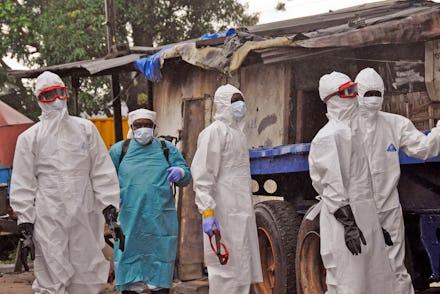Here's Why Africa's Ebola Epidemic Is Officially 'Spiraling Out of Control'

The news: Health authorities admitted Tuesday that the West African Ebola virus epidemic is accelerating quickly and may soon outpace the ability of medical teams to contain it. Meanwhile, the grim situation is being made worse by a massive strike among Liberian health care workers, who have accumulated large amounts of unpaid wages while suffering from overwork and the constant risk of exposure.
"It's spiraling out of control. The situation is bad, and it looks like it's going to get worse quickly," Centers for Disease Control and Prevention director Tom Frieden told NBC News. "There is still a window of opportunity to tamp it down but that window is closing, and we need to act now. ... This is different than every other Ebola situation we've ever had. It's spreading widely, throughout entire countries, through multiple countries, in cities and very fast."
Why is it spreading out of control? Here's what you need to know:
- It's spreading from rural areas to big cities. Ebola virus outbreaks typically originate in rural areas where residents often come into contact with potentially infected wildlife like monkeys or fruit bats. The outbreaks are limited by geographic isolation. With over 3,000 confirmed cases throughout Liberia, Guinea, Sierra Leone, Nigeria and now Senegal, this particular infection has unfortunately spread into urban areas, sparking "low-level panic" in Freetown and other cities. Because Ebola spreads easily in dense, unhygienic environments, poverty-ridden areas of West African metros are particularly at risk.
- The countries with Ebola have been isolated. Frieden told CNN's New Day that restricting air travel to and from the nations suffering the worst of the Ebola epidemic was actually aiding the spread of the disease by making it much more difficult to transport in aid workers, supplies and medical equipment.
"What we're seeing is a spiraling of cases, a hugely fast increase in cases, that's harder and harder to manage," he said. "The more we can get in there and tamp that down, the fewer cases we'll have in the weeks and months to come."
Doctors Without Borders further criticized the international community for ignoring the needs of West African patients, calling the response "lethally inadequate."
- It's hit fragile health care systems and overwhelmed staff. This is the first Ebola outbreak in West Africa, and by far the largest in recorded history. Medical personnel in the countries involved have little to no experience working with Ebola victims; they often work for health care systems that are disastrously underfunded and equipped during the course of regular duties. As a result, some 240 medical workers have caught the disease and half of them died, including Sierra Leone's top expert on the disease and one of Freetown's top physicians.
This talent and manpower cannot be replaced. The WHO claims that Liberia has one doctor for every 100,00 people, while Sierra Leone has just two. What's more, health care workers are beginning to strike thanks to unpaid wages and poor conditions that are exposing them to Ebola.
It could threaten the food supply: According to the UN's Food and Agriculture Organization (FAO), the region's crop harvests are "at serious risk" of disruption. The FAO writes:
In Guinea, Liberia, and Sierra Leone, quarantine zones and restrictions on people's movement aimed at combating the spread of the virus, although necessary, have seriously curtailed the movement and marketing of food. This has lead to panic buying, food shortages and significant food price hikes ...
Senegal-based FAO official Vincent Martin added that in some affected areas, households were spending 80% of their income entirely on food — meaning many people could find themselves desperate and hungry. He said this may lead to "social repercussions that could lead to subsequent impact on the disease containment."
Ebola is already proving a destabilizing influence: Riots in Monrovia over quarantine procedures ended in the death of a teenage boy.
There's no effective treatment: Rare and difficult-to-produce serums aside, there's no effective treatment for the Ebola virus other than supportive care, and there is no vaccine to prevent infection. While the 50% fatality rate in the current epidemic is lower than in many previous outbreaks, hospitals in the region have reached the limit on their capacity and resources.
An experimental new Ebola vaccine developed in joint federal-GSK collaboration is entering human trials this week at the National Institutes of Health, but isn't expected to be available until the end of the year, even if the science pans out. That leaves, at a minimum, around three months before any new way to slow down the number of infections emerges.
In short, the situation is already very bad and getting worse. If authorities lose control of the situation, Ebola could spread more or less unchecked throughout the countries already affected and spread to new ones even faster. The WHO says as many as 20,000 patients are within the realm of possibility.